
Amira Benhima
A passionate advocate for holistic wellness and natural beauty, is an accomplished author specializing in the benefits and uses of Argan oil, with years of experience exploring its wonders.
Key Takeaways
Imagine stumbling upon a hidden treasure, a secret passed down through generations, known only to the locals. This treasure is a beauty elixir, hailed for its purity and nourishing properties. You find yourself drawn to this mysterious substance, eager to unlock its secrets. But how can you ensure its authenticity? How can you separate the pure from the counterfeit? In this discussion, we will explore the local wisdom surrounding Argan oil purity, uncovering the ancient techniques and knowledge that have been preserved by the communities who hold this precious secret. Get ready to embark on a journey of discovery, where every drop of Argan oil tells a story and holds the key to unlocking timeless beauty.
- Traditional production methods and support for local cooperatives ensure the authenticity and purity of Argan oil.
- Look for certifications like USDA Organic or ECOCERT to authenticate the purity of Argan oil.
- Counterfeit products may contain additives or be diluted, so it’s important to look for distinct nutty aroma and golden color in authentic products.
- Certified organic products provide quality assurance, guaranteeing high-quality, pure Argan oil without harmful chemicals or pesticides.
Traditional Production Methods
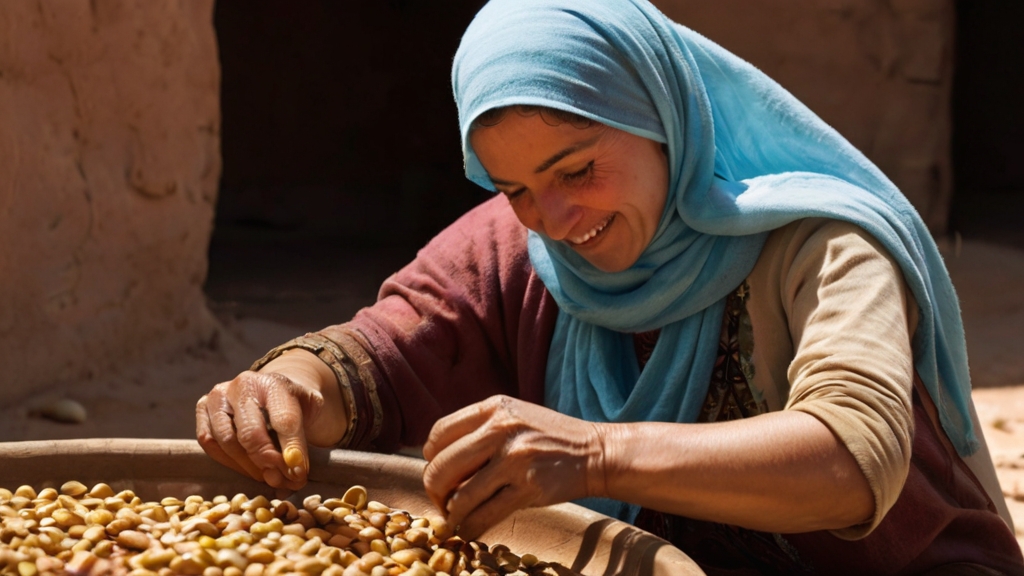
Traditional Argan oil production methods involve the hand-extraction techniques passed down through generations in southwest Morocco. Berber women, who have inherited the knowledge and skills from their ancestors, play a crucial role in this process. Utilizing traditional stone hand-pressing methods, these women extract the precious Argan oil from the kernels of Argan fruits.
The manual extraction process is essential to ensure the purity and quality of Argan oil. By manually pressing the kernels, the Berber women are able to carefully control the pressure and temperature, which helps preserve the oil’s nutrient-rich properties. This attention to detail is what sets traditional production methods apart and guarantees the authenticity of pure Argan oil.
Cooperative-run facilities, where many of these traditional production methods are practiced, emphasize the importance of maintaining the cultural heritage and integrity of Argan oil. By adhering to these time-honored techniques, they ensure that the unique quality and purity of the oil are preserved.
This traditional approach to Argan oil production not only reflects the rich cultural heritage of the region but also serves as a means of empowerment for the Berber women. By actively participating in the production process, these women are able to generate income and support their families, while also preserving their traditional way of life.
Authenticating Argan Oil
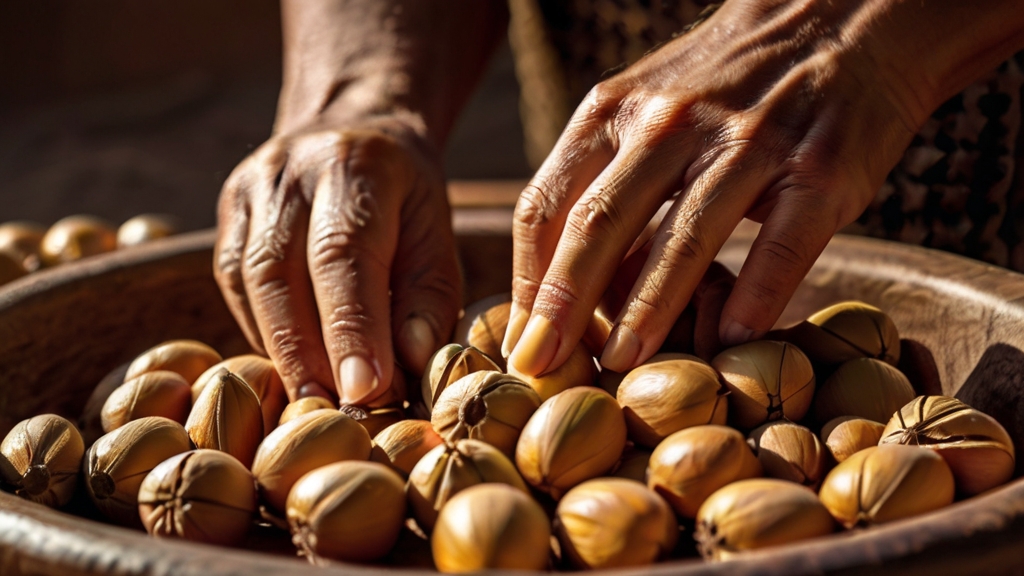
To determine the authenticity of Argan Oil, there are several key indicators to look for when examining the product:
- Source and Extraction: Authentic Argan Oil is sourced directly from the kernels of the Argan tree, without any additives or alterations. It is extracted using traditional methods that preserve the oil’s purity and quality.
- Certification: Look for reputable certifications like USDA Organic or ECOCERT. These certifications ensure that the Argan Oil has been produced in accordance with strict standards, guaranteeing its authenticity and purity.
- Appearance and Aroma: Authentic Argan Oil has a unique nutty aroma and a light texture. It is important to note that synthetic or diluted versions may lack this distinct aroma. Additionally, the color of pure Argan Oil ranges from golden yellow to light amber, which is a result of the natural extraction process.
By paying attention to these indicators, you can authenticate the purity of the Argan Oil you are considering purchasing. Authentic Argan Oil is rich in vitamin E, essential fatty acids, and antioxidants, making it highly beneficial for skincare and haircare purposes. Its purity ensures that you are getting the full benefits of this precious oil.
When serving others, it is essential to provide them with authentic and pure products. By understanding the indicators of authenticity, you can confidently offer genuine Argan Oil to your customers, knowing that they are receiving a product of the highest quality. Incorporating these indicators into your evaluation process will enable you to make informed decisions and provide outstanding service to those seeking authentic Argan Oil.
Detecting Counterfeit Products
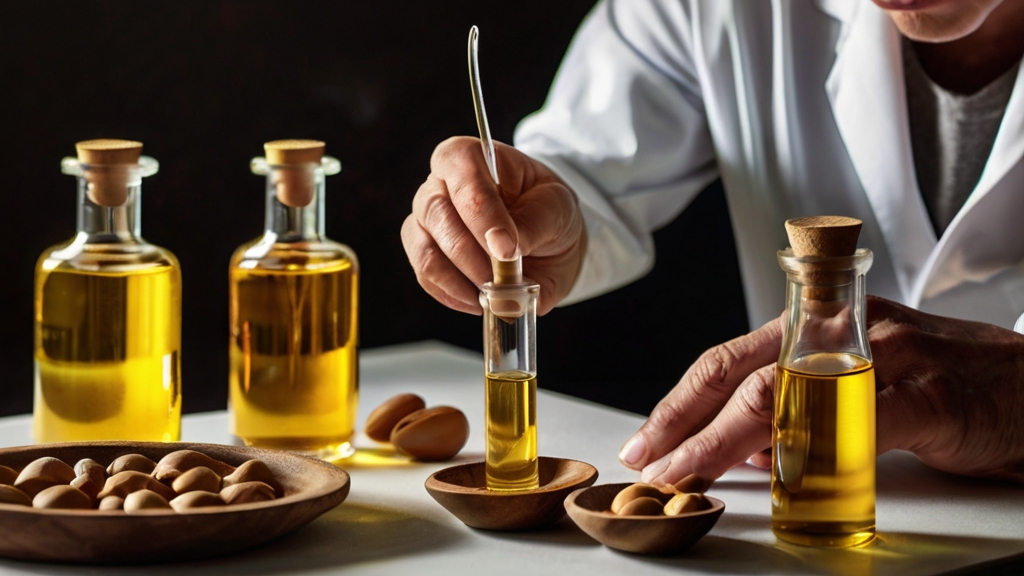
Detecting counterfeit Argan oil products can be challenging, but there are several key indicators to look for that can help you determine the authenticity and purity of the product. Counterfeit products may contain additives or be diluted with other oils, compromising the purity of the Argan oil. To ensure authenticity, it is important to look for products that are sourced from traditional methods. Authentic Argan oil should have a distinct nutty aroma and a golden color.
One way to determine the authenticity of Argan oil is by checking for certifications like USDA organic or Ecocert. These certifications ensure that the product has met specific standards and regulations. Additionally, it is advisable to purchase from reputable brands that source directly from Co-Operatives in Morocco, such as Moroccan Elixir. These brands are more likely to prioritize authenticity and purity.
Price can also be an indicator of counterfeit products. If a product is suspiciously low-priced, it may be an indication that the quality and purity of the Argan oil have been compromised. Counterfeit products often use lower quality ingredients or dilute the oil to reduce costs.
Quality Indicators to Look for
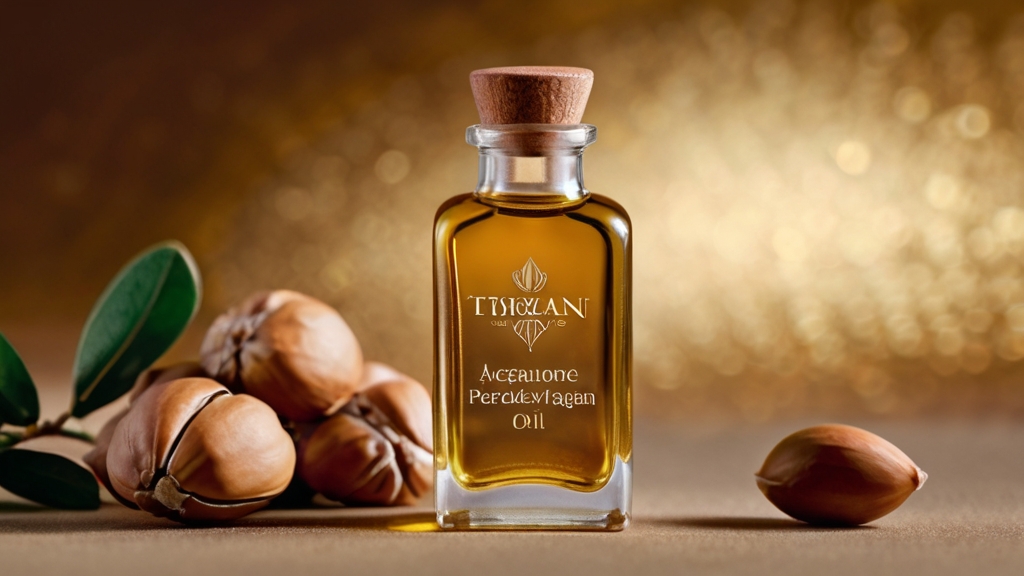
Look for certifications such as USDA Organic and ECOCERT to ensure the purity of Argan Oil. These certifications guarantee that the oil has been produced using organic farming methods and that it has undergone rigorous testing to ensure its quality. In addition to certifications, there are other quality indicators you should look for when purchasing Argan Oil:
- Check the ingredient list for 100% Pure Argan Oil without any additives or fillers. This ensures that you are getting the real deal and not a diluted or adulterated version of the oil.
- Opt for Argan Oil in dark glass bottles. Light exposure can degrade the quality of the oil, so choosing a product that is packaged in dark glass helps to protect it from harmful light rays.
- Seek Argan Oil sourced from reputable Co-Operatives in Morocco. These co-operatives follow ethical production practices and work directly with local communities to ensure fair wages and sustainable harvesting methods. By supporting these co-operatives, you are not only getting a high-quality product but also contributing to the well-being of the local communities.
It is also important to choose Argan Oil that is cold-pressed and unrefined. Cold-pressing ensures that the oil retains its natural properties and nutrients, while avoiding the use of heat or chemicals during the extraction process. Unrefined oil, on the other hand, has not undergone any additional processing, preserving its natural scent and color.
Importance of Supporting Local Cooperatives
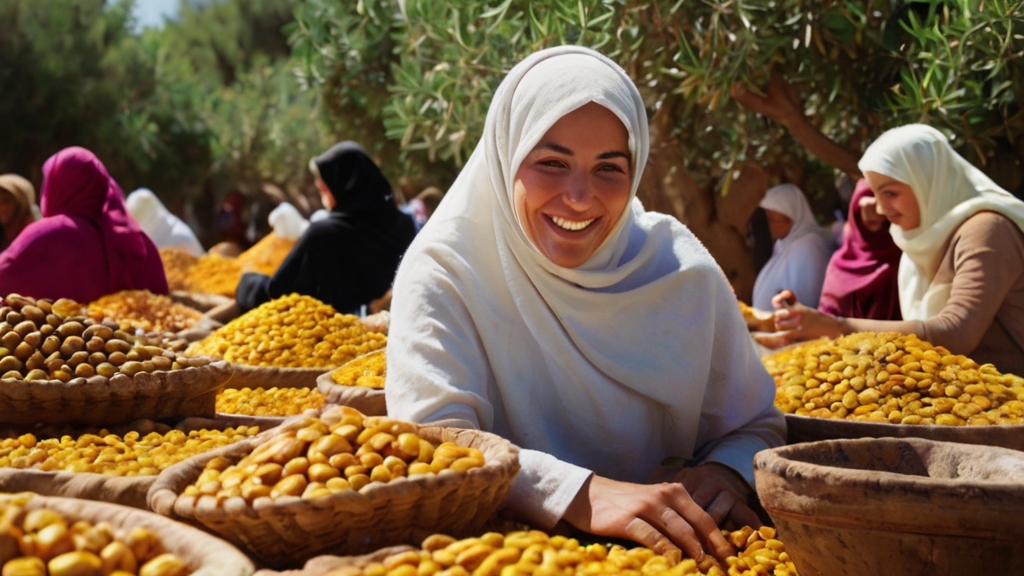
Supporting local cooperatives in Morocco plays a crucial role in empowering women, preserving traditional production methods, and contributing to the sustainability of communities. When you choose to purchase Argan oil from local cooperatives, you are making a positive impact on the lives of women involved in its production.
One of the key benefits of supporting local cooperatives is the empowerment of women. By providing fair wages, benefits, and educational support, these cooperatives enable women to become financially independent and support their families. Many of these women are widowed or divorced, and the cooperatives offer them employment opportunities that help them rebuild their lives.
In addition to empowering women, purchasing from local cooperatives helps preserve the traditional Berber culture and production methods. Women in these cooperatives share their ancient knowledge and skills related to Argan oil production, ensuring that these techniques are passed down through generations. By supporting these cooperatives, you contribute to the preservation of cultural heritage.
Furthermore, sourcing Argan oil from local cooperatives contributes to the sustainability of communities. The cooperatives operate in a way that promotes environmental conservation and sustainable practices. They prioritize the protection of the Argan tree, which is crucial for Argan oil production, and actively participate in reforestation efforts. By supporting these cooperatives, you are helping to maintain the balance between economic development and environmental sustainability.
Tips for Purchasing Pure Argan Oil
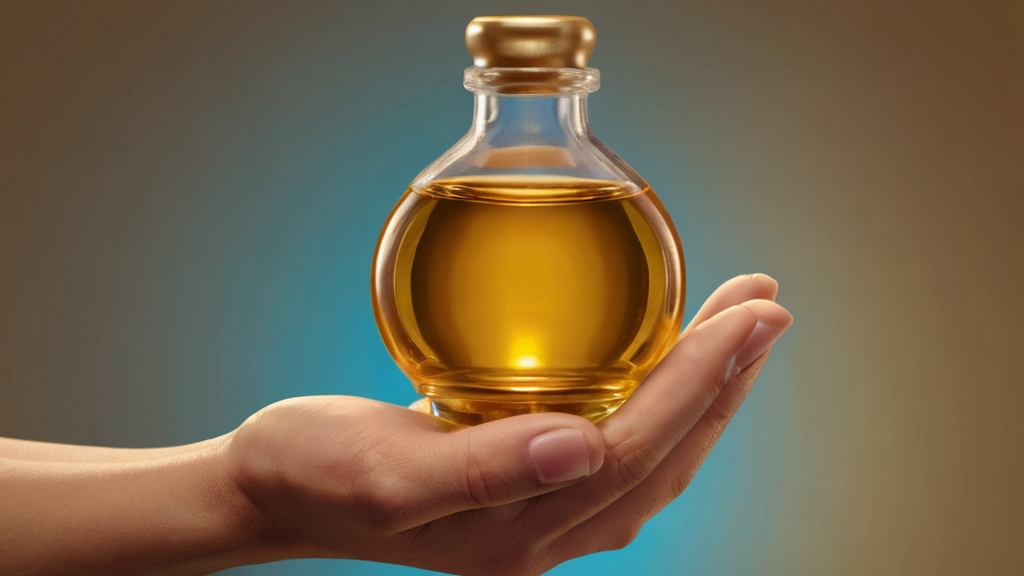
To ensure that you are purchasing pure Argan oil, it is important to consider several factors when selecting a product. Here are some tips to help you make the right choice:
- Look for certifications like USDA Organic and Ecocert: These certifications ensure that the Argan Oil you are buying is of high quality and has met certain standards. Certified Organic products go through rigorous testing to ensure they are free from harmful chemicals and pesticides.
- Check for a list of ingredients: A pure Argan Oil product should have only one ingredient listed – Argania Spinosa Kernel Oil. Avoid products that contain additives or preservatives as they can compromise the purity of the oil.
- Pay attention to the aroma and color: Pure Moroccan Argan Oil has a distinctive nutty aroma and a golden color. These characteristics indicate that the oil has not been diluted or altered in any way. If the oil has a strong or unpleasant smell, or if it has a different color, it may not be pure.
When purchasing Argan Oil, it is also important to consider where it comes from. The Argan Forest in Morocco is the only place in the world where the Argan tree grows naturally. Look for products sourced from traditional Co-Operatives in Morocco, as they are more likely to offer authentic and pure Argan Oil.
Frequently Asked Questions
What Is the Best Brand of Pure Argan Oil?
The best brand of pure argan oil is one that is sourced from traditional co-operatives in Morocco, like Moroccan Elixir or Marjana Argan Women’s Co-Operative. These brands ensure the authenticity and purity of their argan oil through traditional production methods. When purchasing pure argan oil, look for certifications of being 100% natural and organic. Pure argan oil offers numerous benefits for both cosmetic and culinary uses. Users have testified to its effectiveness in improving skin, hair, and overall health.
How Can You Tell if Argan Oil Is Pure?
To determine the purity of argan oil, there are several key factors to consider. First, look for authenticity tests like USDA Organic or ECOCERT certifications. Next, read the label carefully, ensuring that the ingredient list contains only Argania Spinosa Kernel Oil. Additionally, consider the sourcing methods and extraction processes used by the brand. Lastly, dark glass bottles and a smooth texture with a nutty aroma are indicators of high-quality, pure argan oil.
What Is the Purest Form of Argan Oil?
The purest form of Argan Oil is extracted directly from the Argan trees in southwest Morocco. It is unadulterated and free from any additives or artificial substances. This pure Argan Oil is sourced from traditional Women’s Co-Operatives in Morocco, ensuring authenticity and quality. Moroccan Elixir, for example, obtains their Argan Oil from Co-Operatives like Marjana, supporting local women and preserving traditional production methods. This pure Argan Oil is renowned for its numerous benefits for both hair and skin due to its nutrient-rich composition.
Are There Different Grades of Argan Oil?
Yes, there are different grades of argan oil. The production process plays a crucial role in determining the grade. Cosmetic grade argan oil is specifically processed for skincare and hair care purposes. On the other hand, culinary grade argan oil is suitable for cooking. Both grades should be 100% pure and unadulterated to ensure the maximum benefits for your skin, hair, and overall health. It is important to check for authenticity and quality certifications when purchasing argan oil to ensure you are getting the genuine product. In the market, there are also alternatives to argan oil that offer similar benefits.
Related Articles
Traditional Argan Oil Uses by Natives
Discover the astonishing array of traditional Argan oil uses by natives, from culinary delights to medicinal wonders, that will leave you amazed and craving for more.
UV Absorption Rate of Argan Oil
Get ready to uncover the surprising truth about the UV absorption rate of Argan Oil, and how it could revolutionize your sun protection routine.
Berber Argan Oil Production Techniques
Discover the intricate 'P'rocesses behind Berber Argan oil production, and unravel the secrets to its exclusivity, cultural heritage preservation, and high value.


